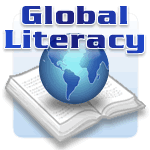Coverage

Global Literacy: An Overview
August 11, 2008
HotChalk
Universal Digital Literacy - A Critical, Core Requirement

In this 21st-century era of dissolving physical boundaries, a digital-based workforce and new “flat-world” economic opportunities, recognizing the crucial role of technology in both individual and national success is key.
The world is shrinking at a dizzying rate, and developing nations in particular are aggressively pursuing opportunities to ensure their populations and education programs are up to speed with technology.
That recognition--- that technology is a core requirement for 21st century life--- is the single largest issue affecting digital literacy, says David Saedi, CEO of Certiport, a Utah-based company which develops international computer proficiency standards, and provides training and certification in Microsoft and Adobe products.
HotChalk caught up with Saedi at Certiport’s seventh annual Pathways digital literacy conference, this year taking place in Kona, Hawaii.
The Digital Divide
“Most economically disadvantaged people still don’t realize the lack of access to opportunity stems from a lack of competence in digital literacy,” Saedi said. That’s where government and education leadership comes in. It’s their job to make the connection.
Nations with centralized education systems, such as China, are leading the charge and implementing digital literacy training programs faster than anyone else. For those countries, the news is good.
Lack of Urgency in U.S.
But it’s not so encouraging for the U.S., which isn’t acting with the same urgency, Saedi said. Only California and New York have statewide initiatives that include government, business, and education components in efforts to develop digital literacy, he said. “Awareness is definitely increasing around the world,” Saedi said. “But the U.S. is lagging.”
Vocational Training
A second global trend Saedi pointed to is the increasing recognition of vocational training as a key element in the economic success of individuals and nations. “Going to a university is not for everyone, but being employed is for everyone,” he said. Smaller chunks of tailored-to-the-job computer skills training are part of a changing international landscape of work force preparation. Again, other countries are seeing the light sooner than the U.S., Saedi said, citing China, Peru, and the Philippines.
Success Stories
The conference, which featured education-to-employment experts from around the world, did however showcase some individual U.S. success stories. A central element of the Pathways conference is a worldwide digital literacy and technology skills competition for students, which tests their mastery of Microsoft Office applications. This year 56,000 students from 47 countries—including Thailand (which produced the two top winners) participated in local, regional, and national competitions from October 2007 to May 2008.
Justin Wainscott, 18, was one of two U.S. finalists, both from the same Reno, Nevada technical institute that Certiport brought to the event. Wainscott, who got the highest ranking in the U.S. in Microsoft Word skills, took a year of computer classes at the institute while still in high school. He rolls dough at a pizza parlor, supports himself, and plans to go to college and eventually get a master’s degree in programming. In the meantime, he thinks about working at an electronic game company that might help out with college expenses. Wainscott is pretty sure that his certifications will help him to achieve his goals. And of course he was glad to be rewarded with a trip to Hawaii for his efforts. “It feels like all that hard work has really paid off—the long hours of studying, the waking up early and staying up late, just trying your best,” Wainscott said.
As the crossroads of the Pacific, Hawaii was an appropriate location for the conference, said Hawaiian state Senator Norman Sakamoto, a Democrat, in Kona as a keynote speaker for the event. Because Hawaii has only one school district governing the entire state of several islands, it offers a unique educational laboratory, said Sakamoto.
Hawaii Early Adopter of Technology
The state was one of the first to broadly promote digital literacy. In 2005, the Hawaiian Department of Education and Certiport set up a multi-year agreement to offer training and certification to 14,000-plus eighth-graders and their teachers. The state also worked with Dell’s TechKnow computer donation program to further enable middle schools to facilitate technology education.
The state also lead the technology charge with an innovative videoconference-based professional development program for administrators, in partnership with the Harvard Change Leadership Group, in 2006. The five-island state has specific challenges, said Sakamoto, who chairs the Hawaii Senate’s education committee.
“One of those challenges is that many of our students feel they want to go somewhere else,” Sakamoto said. Several of the islands’ better students are able to leave and, once gone, decide not to return home. The state’s reliance on tourism as a primary economic influence means many available jobs are in the service industry, not a particularly attractive option for the more ambitious students.
Another challenge is the state’s single-district status, which can make large-scale implementations of technology or other programs unwieldy, Sakamoto said. If the state does a pilot program, the buy-in of all parties involved is required. This can be a challenge, but sometimes also an advantage, he adds. More work is needed, but the state is making progress overall in its digital literacy efforts, said Sakamoto.
International Champions of Digital Literacy
In addition to recognizing students, the Pathways conference honored six individuals from different countries in its network of international markets as “Champions of Digital Literacy.” Attended by over 200 participants from 24 nations, conference award winners represented Peru, Guatemala, the Philippines, Iraq, the U.S., and Germany.
Compelling International Stories
HotChalk’s five-story series on the conference will relate compelling stories of how the developing nations singled out for awards--Peru, Iraq, the Philippines, and Guatemala--are making huge strides in digital literacy in the face of overwhelming obstacles.